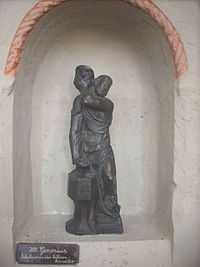Genesius of Rome
| Saint Genesius of Rome | |
|---|---|
|
Statue of St. Genesius with mask and baptismal font in St. Giles Church in Braunschweig, Lower Saxony, Germany | |
| Actor & martyr | |
| Venerated in | Roman Catholic Church and Eastern Orthodox Church[1] |
| Major shrine |
Church of Santa Susanna, Rome, Italy |
| Feast | August 25 |
| Patronage | actors, clowns, comedians, comics, converts, dancers, musicians, stenographers, printers, lawyers, epileptics, thieves, torture victims[2] |
Genesius of Rome is a legendary Christian saint, a comedian and actor who worked in a series of plays that mocked Christianity. The story says that one day while performing in a work that made fun of baptism he had a conversion experience on stage. He announced his new faith, and refused to renounce it, even when ordered to do so by emperor Diocletian.
Genesius is regarded as the patron saint of actors, lawyers, barristers, clowns, comedians, converts, dancers, epileptics, musicians, printers, stenographers, and torture victims. His feast day is August 25.
Legend
The story says that Genesius, the leader of a theatrical troupe in Rome, performing one day before the Emperor Diocletian, and wishing to expose Christian rites to the ridicule of his audience, pretended to receive the Sacrament of Baptism.[3]
At the start of the play Genesius lay down on the stage as if sick. Two other actors asked what was wrong. Genesius said he felt a weight that he wanted removed. Hence, two other actors, dressed as a priest and exorcist, were called in. They asked what he wanted. He replied, "A baptism." Thereupon, he said, he saw a vision of angels bearing a book with all his sins inscribed. The actor portraying the priest asked him: "My child, why did you send for me?"
At this point, Genesius claimed to actually see angels and asked to be baptized himself onstage. Enraged, Diocletian had him turned over to Plautia, prefect of the praetorium, for torture. When Genesius persisted in his faith, he was beheaded.
Burial and legacy
Genesius was said to have been buried in the Cemetery of St Hippolytus on the Via Tiburtina. There are said to be relics in San Giovanni della Pigna, Santa Susanna di Termini and in the chapel of St. Lawrence. The legend was dramatized in the fifteenth century; embodied in later years in the oratorio "Polus Atella" of Löwe, and still more recently in a work by Weingartner. The historic value of the Acts, dating from the seventh century, is very doubtful, though defended by Tillemont (Mémoires, IV s. v. Genesius). He was venerated, however, at Rome in the fourth century: a church was built in his honor very early, and was repaired and beautified by Pope Gregory III in 741.[3] There is also a 4th-century gold glass portrait of him.[4]
Origins of the Legend
The legend of Genesius of Rome originated with the historical Genesius of Arles, a notary who died as a martyr in ca. 303 AD under Maximianus.[3] Because his cult spread to Rome, it was assumed that he was a Roman martyr and was buried there. Later on, even more confusion helped to create an entirely fictional legend, in which he was a comedian who had converted to Christianity half-way through performing an anti-Christian satire, and was then beheaded. This latter story began in the 6th century at the latest.[5] A similar tale was told about Gelasius of Heliopolis.[6]
Contemporary relevance
The cult of St Genesius continues today and the actor-martyr is looked upon as the patron of actors and various acting societies, including those which aim to assist actors. The British Catholic Stage Guild regards him as their patron saint, and the Shrine of St. Genesius in Saint Malachy's Roman Catholic Church in the New York City Borough of Manhattan, serves as a spiritual landmark for the city's acting community. As the patron saint of epilepsy, many turn to him for his help. Since Genesius is associated with stagecraft, he is also venerated by stage magicians and illusionists. He is one of the patrons of the Catholic Magicians' Guild.
There is a Genesian Theatre in Sydney, Australia, which hosts six seasons each year and is a vibrant amateur acting community. Other amateur theater companies around the world also use the name, including the Genesius Guild of Hammond, Indiana, which hosts an average of four productions per year and an annual children's theater camp, the Genesius Theater of Reading, Pennsylvania, and the Genesius Guild and Foundation in the Quad Cities in the United States, which focuses on classical Greek Drama.
A new association in the Roman Catholic Church, The Fraternity of St Genesius, has been founded under this Saint's patronage. It aims to support men and women who work in theatre and cinema.[7]
References
| Wikimedia Commons has media related to Saint Genesius. |
- ↑ Orthodoxwiki
- ↑ http://saints.sqpn.com/saint-genesius-of-rome/
- ↑ 3.0 3.1 3.2 Mershman, Francis. "Genesius." The Catholic Encyclopedia. Vol. 6. New York: Robert Appleton Company, 1909. 25 Jan. 2013
- ↑ Grig, Lucy, "Portraits, Pontiffs and the Christianization of Fourth-Century Rome", p. 219, Papers of the British School at Rome, Vol. 72, (2004), pp. 203–230, JSTOR
- ↑ David Hugh Farmer, Oxford Dictionary of Saints. Fifth Edition (Revised). (Oxford: Oxford University Press, 2011), 180.
- ↑ J. C. Cooper, ed. Dictionary of Christianity, page 104.
- ↑ Fraternity of St Genesius
